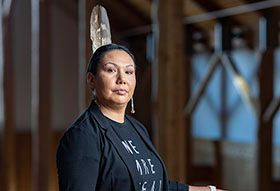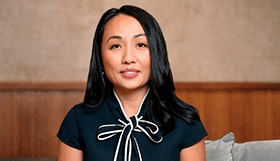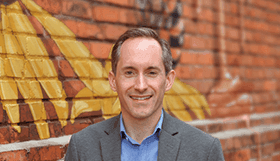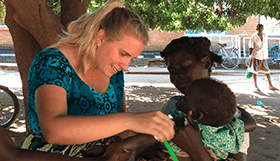2011 Forward under 40 Award Honoree
UW Majors: Business Marketing and Economics
Age: 34 | Baltimore, Maryland
Executive Director, National Federation of the Blind Jernigan Institute
Mark Riccobono learned the hard way that there's a better path to equal education for the blind. Now he works to make sure people who find themselves in his situation don't have to go through the same challenges.
Diagnosed with a degenerative eye condition at age 5, Riccobono's sight deteriorated year after year, forcing him to compensate by combining intense magnification devices and lighting in order to read and write, albeit for short time spans. Such techniques enabled him to get by, but did not allow him to realize his full potential. It was only after graduating high school that he had the chance to learn Braille.
"All I knew, all I had been taught, all I believed was that vision was a requirement for success," he says.
Braille literacy is a personal passion for Riccobono, and he's now at the forefront of efforts to promote it through programs such as national reading contests, pre-literacy family reading programs, an online peer-to-peer Braille book-sharing site and regional summer programs. Currently, only 10 percent of blind children in America are learning Braille, and Riccobono is now working to build the resources, expertise and networks to double the literacy rate by 2015.
"While the education will be better for blind children, the rest of our society will benefit as well," he notes. "As a nation, we are currently underutilizing the potential talent of these children — as evidenced by the 70 percent unemployment rate among working-age blind people today."
Riccobono's work on behalf of the blind began in 1996, when he founded and became the first president of the Wisconsin Association for Blind Students at UW-Madison. During his senior year, he was elected president of the National Federation of the Blind (NFB) of Wisconsin, where he directed day-to-day advocacy and education efforts while finishing his degree. After being re-elected to that position twice after graduation, Riccobono took his talent to NFB's headquarters in Baltimore, Maryland, and now serves as director of its Jernigan Institute, the first institute focused on blindness and run by the blind.
In addition to advocating for Braille literacy, Riccobono has led groundbreaking forays into science, technology, engineering and math education for blind students. Through inventive methods that facilitate nonvisual participation, Riccobono has orchestrated hands-on science experiences for blind youth to explore topics such as rocketry, robotics, astronomy, engineering, biology and environmental science, long thought to be fields dependent on sight.
The Jernigan Institute's current visionary project is the Blind Driver Challenge, which challenges universities, technology developers and other innovators to build interface technologies that will empower blind people to drive a car independently. Whether or not blind people will drive on public streets remains to be seen, but at the heart of the initiative is the importance of nonvisual technology, which can also be integrated into home appliances, consumer electronics, office equipment and other challenges blind people face every day.
"When you start with the prospect that little is possible, it is hard to get more than a little accomplished," he says. "In five years, we will have expanded the horizons of independence, even if we will not quite be at the point where blind people are driving cars on the streets — that might be 10 years down the road. And, we will have shattered misconceptions about the capacity of blind people by demonstrating that the lack of eyesight does not equal a lack of vision or ability."
In his own words
If you could trade places with any person for a week, living or dead, real or fictional, with whom would it be?
This is a very tough question. I think I am going to have to go with Albert Einstein. Getting a glimpse of how such a genius mind works and how it feels to be pushing patterns of thought even though some of them are against basic scientific establishment would be fascinating.
What's your guilty pleasure?
Ice cream (is that Babcock's fault?) and wine
What's your favorite quote?
"Great spirits have always encountered violent opposition from mediocre minds." — Albert Einstein
I first came across this quote on a poster I bought on State Street. I had the poster for a number of my years at Madison. It was pretty beat up after I left college, but I found a new one, and it has been framed and hung in each of my offices for the last decade.
What advice would you offer to graduating seniors?
Remind yourself daily that the UW simply prepared you for the real classroom — the world. Commit yourself to discovering, inquiring, sifting and winnowing each day, and the UW spirit will continue to take you to unimagined places.




